Data Analytics in Hospitality Industry
Hello everyone, and welcome! Today, we’re diving into the fascinating world of data analytics in the hospitality industry. With competition growing and customer expectations evolving, traditional methods just don’t cut it anymore. Discover how data analytics equips hotels and hospitality businesses with invaluable insights into customer behaviour, preferences, and patterns. This knowledge empowers them to customize offerings, enhance service quality, streamline operations, and boost revenue. Stay tuned for an in-depth look at the transformative impact of data analytics in this exciting sector!
Big Data Analytics in the Hospitality Sector
In today’s data-driven world, the hospitality industry relies heavily on big data analytics for informed decision-making. By analyzing extensive datasets from diverse sources, businesses can extract valuable insights that impact operations, marketing strategies, occupancy rates, and food and beverage sales. Big data analytics helps hotels and restaurants enhance the guest experience by personalizing room preferences and offering customised suggestions for local events or culinary choices based on past preferences. These personalized experiences foster stronger connections with customers, encouraging repeat visits and building brand loyalty. In essence, data analytics is a key driver of success in the modern hospitality industry, helping businesses meet customer expectations, improve operations, and stay ahead of the competition.
Discovering New Paradigms with Data Analytics
Data analytics is a crucial driver of success in the ever-evolving hospitality industry. The vast amount of generated data is a treasure collection of insights for businesses savvy enough to harness its potential. As competition increases and customer expectations evolve, adopting big data analytics and data science is no longer just a strategic advantage—it’s a necessity.
By strategically using data analytics, businesses can unearth patterns, predict trends, optimize operations, and deliver personalized experiences that cultivate customer loyalty.
Let’s explore some of the best use cases in this dynamic realm.
Personalization
Providing personalized experiences greatly enhances customer satisfaction. Data analytics helps gather detailed customer profiles, including likes, dislikes, preferences, and behavioural patterns. Using this data, businesses can personalise their services to individual guests, anticipating their needs before they express them. This leads to increased customer loyalty and higher rates of return visits.
Dynamic Pricing
Data analytics aids in yield management by adjusting prices based on various factors such as demand, competitor pricing, local events, and historical data. By analysing occupancy rates, room prices, local events, weather, and market trends, businesses can predict periods of high and low demand. Prices can then be adjusted in real-time to maximize revenue during peak periods and encourage bookings during off-peak times.
Predictive Maintenance
Data from equipment sensors, maintenance logs, and other sources can predict when equipment might fail. This allows for proactive maintenance, preventing costly downtime and unexpected issues.
Demand Forecasting
Analyzing historical data and considering external factors like events, seasonality, and market trends helps predict future demand. This information is crucial for effective resource planning, including staffing levels, inventory management, and capacity planning.
Customer Feedback Analysis
Sentiment analysis tools can analyse customer reviews, social media comments, and other feedback, providing insights into how customers perceive the business. This highlights areas for improvement and areas of strength. Prompt responses to customer feedback can also enhance the business’s reputation for customer service.

Competitor Analysis
This allows businesses to stay competitive, identify gaps in the market, and adapt to changing industry trends.
Targeted Marketing
With detailed customer profiles and segmentation, businesses can design more effective marketing campaigns that resonate with their target audience. This includes personalized email campaigns, targeted ads, and special offers for specific customer segments, leading to higher conversion rates and a better return on marketing spend. By leveraging data effectively, businesses can gain a competitive edge, improve operations, and enhance customer satisfaction.
As we wrap up our exploration into the fascinating world of data analytics in the hospitality industry, it’s clear that this transformative tool is more than just a trend—it’s a game-changer. From unraveling intricate customer preferences to optimizing operational efficiency, data analytics shapes the future of hospitality. Yes, challenges exist, like navigating data privacy concerns and finding skilled professionals. However, the undeniable power of big data analytics to enhance customer experiences, streamline operations, and foster innovation reaffirms its pivotal role in the industry’s evolution. For businesses ready to embrace the data-driven revolution, the journey is not just about analytics; it’s about unlocking new possibilities and ensuring a seat at the forefront of hospitality excellence.
Thank you for joining us on this insightful journey into the transformative landscape of data analytics in the hospitality industry. Stay tuned for more explorations into the dynamic intersection of technology and hospitality. Until next time, happy exploring!
For further assistance, visit our channel and refer the video named

Share This :


Your article helped me a lot, is there any more related content? Thanks!